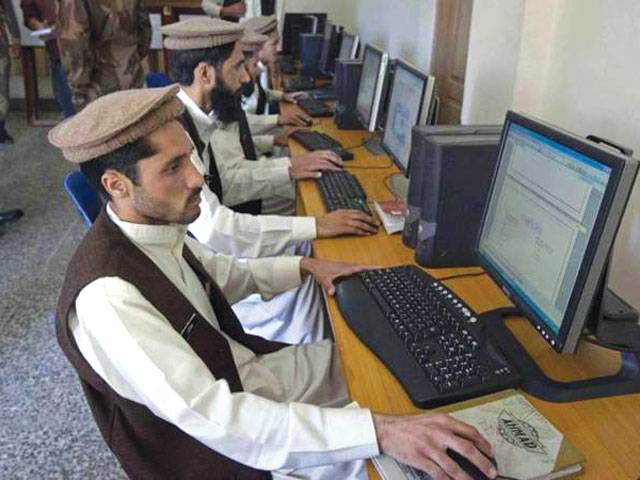Belen Fernandez
A concise news item in the January 6 edition of the British Independent bears the headline: "Muslim mothers should be trained in computing 'to help to spot radicalisation'."
The article summarises the findings of a study conducted by the London-based women's charity JAN Trust: "The study of 350 Muslim women, conducted between last June and October, found that 92 percent did not understand the term 'online radicalisation', nor that their children could be radicalised online. It said three-quarters of all mothers surveyed had seen or heard their children accessing Islamic lectures, yet 90 percent were unaware of their content."
No matter, of course, that the majority of people in the world presumably do not understand the term "online radicalisation". Such unawareness is apparently only cause for concern when associated with a certain religious cohort.
The charity's sound ethical orientation is meanwhile underscored by the fact that one of its four patrons, Baroness Shreela Flather, is the UK politician known for accusing Pakistani and Bangladeshi immigrants of over-breeding in order to accrue government benefits.
Defending her stance, Flather - born in Lahore, British India, and the UK's first female Asian peer in the House of Lords - declared: "Nobody likes to accept that, nobody likes to talk about it because it is supposed to be very politically incorrect."
If a minority says it, it must be PC
The whitewashing of political incorrectness and racism by more fortunate affiliates of generally-persecuted minorities is also an established phenomenon when it comes to the international hype surrounding the alleged "radicalisation" of Muslims.
Former Wall Street Journal reporter Asra Nomani, for example, has exploited her position as a Muslim in the US to provide "indigenous" cover to the New York City Police Department for its oppressive race-based surveillance practices. As the Associated Press revealed in 2011, the NYPD was "operat[ing] far outside its borders and target[ing] ethnic communities in ways that would run afoul of civil liberties rules if practised by the federal government". The department's CIA-assisted spying on innocent Muslims in the New York area and beyond was "welcome news" to Nomani, who in a 2012 article for The Daily Beast insisted: "Last year, I argued: profile me. This year, I say, too: monitor me. Indeed, just as we need to track the Colombian community for drug trafficking and the Ku Klux Klan for White extremists, I believe we should monitor the Muslim community because we sure don't police ourselves enough."
As I've pointed out before, Nomani's attempted legitimisation of Islamophobia fails to account for the fact that, while the vast majority of KKK members are by definition "White extremists", most Colombians and Muslims are not criminals. Aside from the obsessive scrutiny of Muslim taxi drivers and food cart vendors, meanwhile, another contemporary NYPD accomplishment is the production of a 2007 manual titled "Radicalisation in the West: The Homegrown Threat," which seems to confirm JAN Trust's recent charitable alert.
Via a hodgepodge of pseudo-scientific analysis, the manual purports to outline the online behaviour of Muslims undergoing various phases of "radicalisation": "During the Indoctrination phase those undergoing this self-imposed brainwashing devote their time in the cyber world to the extremist sites and chat rooms… The Internet becomes a virtual 'echo chamber' - acting as a radicalisation accelerant while creating the path for the ultimate stage of Jihadisation."
Collateradicalisation
The notion that Muslim communities are uniquely afflicted by online radicalisation becomes even more preposterous when we consider, for example, the recruitment methods of the US Armed Forces - an entity intimately associated with the devastation of Muslim lives.
In his book, "Irregular Army: How the US Military Recruited Neo-Nazis, Gang Members, and Criminals to Fight the War on Terror" - the very title of which suggests a substantial presence of radicals in non-Muslim populations - journalist Matt Kennard recalls some of these methods, such as the "use of video games to glorify military combat, sanitising its perception among the young".
Following the 2002 release of the combat-glorifying Army Game Project for download from the Internet, Kennard writes, "[T]he army proceeded to release the Virtual Army Experience, which it boasted was 'based on actual missions' in its promotional video complete with images of Iraq. The game was the standard murder-fest, in which the player hunts down and kills the enemy… It was the ultimate entertainment, except this time it was used to sign up kids for real war."
For what can happen when soldiers conflate real war and video games, see the upbeat and indiscriminate slaughter of Iraqis contained in the WikiLeaks-released footage "Collateral Murder".
As for JAN Trust's suggestion that Muslim mothers be trained in computing so as to safeguard their offspring from radicalisation, it seems that more effective safeguards might entail a reigning in of destructive militarism abroad and anti-minority discrimination at home.
But in the blindered vision of bellicose surveillance states, such logic doesn't compute.
Belen Fernandez is the author of The Imperial Messenger: Thomas Friedman at Work, published by Verso.–Aljazeera
Friday, April 19, 2024
E-radicalisation and Islamophobia

Caption: E-radicalisation and Islamophobia
8:27 AM | April 19, 2024
8:09 AM | April 19, 2024
Iconic actor Muhammad Ali being remembered on birth anniversary
10:02 PM | April 19, 2024
Death anniversary of Urdu writer Imtiaz Ali Taj today
10:01 PM | April 19, 2024
Umer Sharif remembered on birth anniversary
10:00 PM | April 19, 2024
Islamabad High Court to monitor Hajj 2024 operations
9:58 PM | April 19, 2024
Pak economy improving, funds will be provided on request: IMF
9:57 PM | April 19, 2024
A Tense Neighbourhood
April 19, 2024
Dubai Underwater
April 19, 2024
X Debate Continues
April 19, 2024
Hepatitis Challenge
April 18, 2024
IMF Predictions
April 18, 2024
Kite tragedy
April 19, 2024
Discipline dilemma
April 19, 2024
Urgent plea
April 19, 2024
Justice denied
April 18, 2024
AI dilemmas unveiled
April 18, 2024
ePaper - Nawaiwaqt
Advertisement
Nawaiwaqt Group | Copyright © 2024





